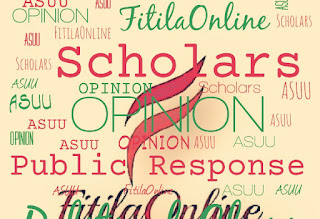"In an event of conflict between intellectuals and government, the public would be at the receiving end."
The ongoing discord between ASUU and Federal Government (the political class), and the public reaction it has generated shows that the future of the country is still bleak. In the developed countries, the synergy is apparent between government/policymakers, researchers/scholars and even with the private sector, the capitalist. Industrialisation, economic policies, security, infrastructure, agriculture and so on are managed mostly based on the output of studies and recommendations of experts. The importance they attach to education informs why allocation of reasonable percentage of budget to the sector. History tells us that, Africa was easily conquered and colonised by Europeans based on the intense study of Africa made by European explorers before the coming of soldiers. This shows that even in the battle ground, it is not the superiority of weapons, or colossal number of troops that first and foremost, matter, it is knowledge; of ambush, guerrilla warfare, terrain, efficient utililisation of weapons, sacrifices and so forth. Americans can tell us more for they have the first hand knowledge from the Vietnamese.
In a society that understand the primacy of knowledge, scholars are highly respected, and furnished with comforts in order to facilitate the task of knowledge production. However, ours is a frustration of scholars by political class through through giving them meager amount as salary and withholding it without justification.
In an event of conflict between intellectuals and government, the public would be at the receiving end. One of the most important lessons of knowledge is freedom. An intellectual always ask questions, demand for justification on why things are done and why they are not. This is a challenge to brutal government. It is not a new phenomenon. Since the colonial period, the colonisers regarded education as a weapon, that if properly given to Africans, would be used to demand for independence. An indolence person would easily be ruled, kowtow to dictators, show gratitude to his exploiters while they punish him by siphoning public treasury. And this is glaringly happening in Nigeria where people thank a government for constructing a poorly constructed road, for instance- a constitutional responsibility. Beside, only God knows the money embezzled through such contract.
Therefore, the intellectuals found it imperative to engage in constructive criticisms of government policies that are inimical to our peaceful coexistence. Second, on behalf of the public, scholars have seriously engaged the government on the revatilisation of education in the country. The government, however, instead of responding to issues raised, engaged in ad hominem fallacy; that intellectuals are occupying different slots of jobs for younger one. The government went ahead to starve its teachers, its most productive segment of population who sacrifice their salary to publish their research findings for the betterment of the country. By so doing, the government only shows its insincerity, lack of patriotism, evasion of response to intellectual challenge. But fortunately, scholars are derived by ideology. An ideological person can nether be frightened by dictators nor succumbed to their pressures. An ideological person can only succumb to superior idea/argument usually through dialogue. When Nelson Mandela was released from prison after he spent almost 27 years, he said, “The factors which necessitated the armed struggle still exist today. We have no option but to continue.” That’s ideology.
If government is facing economic challenges, the best is to consult with experts in the universities; the experts on economy, public finance, historians, etc. Mere increase of taxes and exploitation of workers cannot solve the economic problems. In the context of Nigeria, increase in taxes would simply aggravate the problems of the common man- the usual victim of the state, for there wouldn’t be commensurate infrastructures. Walter Rodney was explicit on this since the 1970s that taxes simply transfer money from one hand to another. In Nigeria, it is one of the strategies for widening income inequality and hence, development of underdevelopment. Economic development is acquired through efficient utilisation of natural resources beneath the earth surface, in the rivers and atmosphere.
In a state of conflict between the scholars and political class, the general public has nothing to celebrate. Then who would be the most vulnerable of such conflict? The political class always tries to perpetuate itself on power by using all means it could. Scholars are aware of this and would therefore take necessary measures on how to respond to the situation. The general public, who supposed to show sympathy to scholars would therefore face the consequences. In a situation whereby scholars and government parted ways, it means policies are laid down not based on research, absence of planning for the economy or education, governance based on myopic thinking of rulers, infringement upon people’s right, and in a long run, emergence of dictators even in a so called democratic government, because education is an integral aspect in the running of efficient democracy.
The general public should note that, in a situation whereby government and scholars forget education, such a country is definitely on the verge of collapse, ready to serve as competing ground for predators, the imperialists. This is where ASUU doesn’t want us to be. ASUU, therefore, remained committed, not on its welfare but the overall development of education in the country. The outcome of qualitative education are profound; effective security, better medical services, improvement of agriculture, employment opportunities, free and fair elections, etc. Those who have alternative of these wouldn’t mind to see these development in Nigeria. For those of us without alternative but to go to Nigeria’s schools, hospitals, roads, and also face the consequences of insecurity, ASUU is here for us. Let’s join hands to compel the government to the needful. Our education is our future.
Yusuf Abdullahi History Department, Federal University Dutsin-Ma



No comments:
Post a Comment